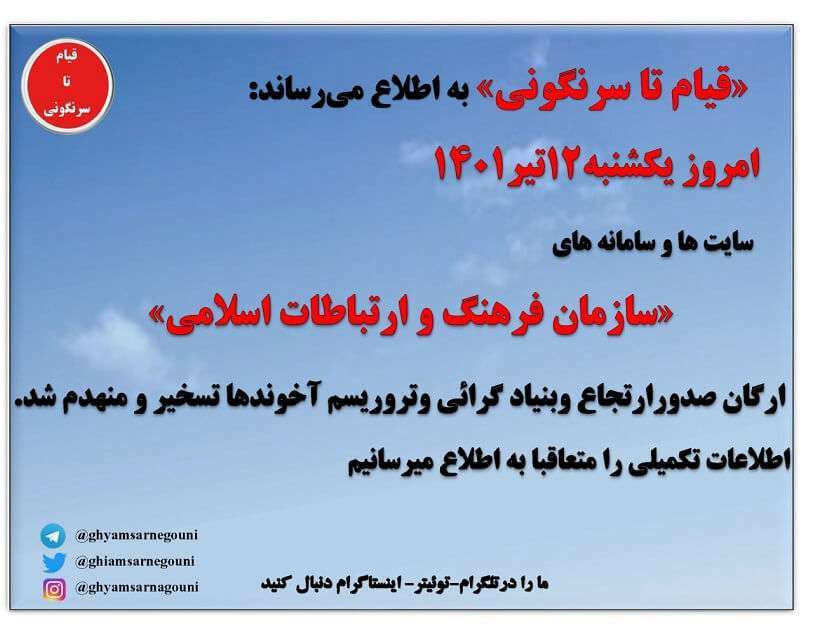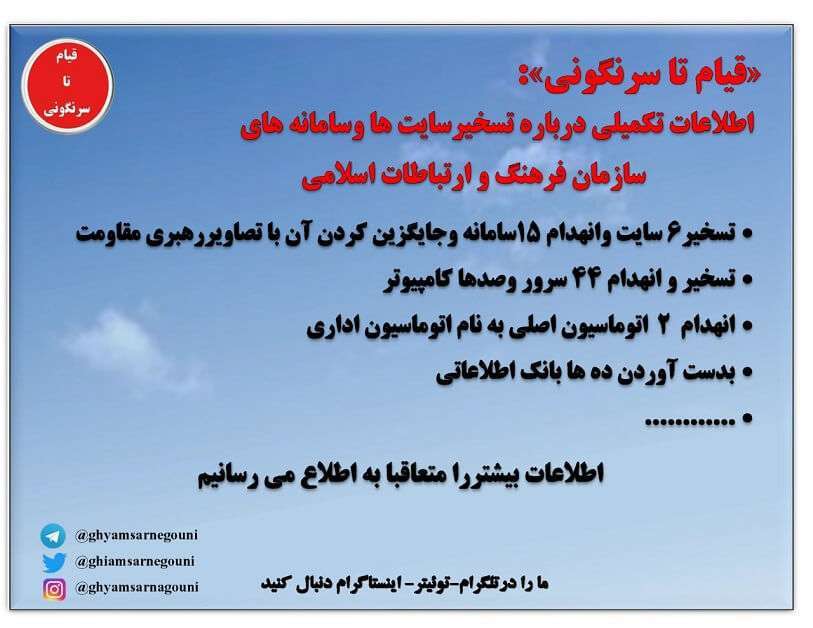Islamic Culture and Communications Organization (ICCO)

Aiming to consolidate all the activities of exporting extremism to different countries of the world, especially Muslim countries, and to promote and propagate the velayat-e faqih (Supremacy of clerics), the Islamic Culture and Communications Organization (ICCO) was officially established in 1995. This organization is key in establishing terrorist activities and recruiting fundamentalist and extremist elements.
Although this organization is considered a part of the Ministry of Culture and Islamic Guidance, in practice, it is a key part of Khamenei's office. The constitution of this organization has been drafted with Khamenei’s approval, and all its Supreme Council members. The directors of this organization as well as its head are appointed by Khamenei. The ICCO’s supreme council includes two ministers and the international relations deputy of Khamenei's offices, which confirm its important role and position in the regime.
Although huge sums are allocated to this organization from the country’s approved budget, it is provided huge sums through unofficial funds, including huge sums under the control of Khamenei’s office.
Cleric, Mehdi Imanipour is the current head of ICCO.
Up until 1993, there were about 12 different organizations and ministry organs like the international office of the Islamic Culture and Guidance Ministry, the international affairs office of the Qom Islamic Propaganda, the international office of the Islamic Propaganda Organization, Ahl ul-Beyt World Assembly, Al-Islamiya Friendship Among Religions (Taqrib), Khamenei office's communications department, Khamenei office's international department, Khomeini International University tied to the Culture and Higher Education Ministry, International Center for Islamic Sciences, cultural organizations tied to the government, the Astan-e Qods Razavi, the Mostazafan Foundation, the Red Crescent, Jahad Sazandegi, the Islamic Revolutionary Guard Corps (IRGC), and the Intelligence Ministry, among others.
The centralization plan of propaganda centers outside Iran was approved in September 1993 by Khamenei. By early 1996, the Islamic Culture and Communications Organization started its official work as one of the supreme leader's affiliated organizations. ICCO's constitution states, among other things, that "all non-governmental organizations and institutions are obliged to carry out their promotional cultural activities abroad with the coordination of the organization. The fundamentalist organs of the Ahl-ul Beyt Assembly, the Taqrib, and the Council for Expansion of Farsi Language and Literature retained their mandates when they were transferred to the Islamic Culture and Communications Organization.”

The Supreme Policy Council is the highest body to set policy and guidelines of the Islamic Culture and Communications Organization. The Supreme Council is comprised of 11 members, including ministers and others appointed to the body by the supreme leader.
Composition of the Supreme Council:
- Three scientific and cultural personalities, chosen by Khamenei.
- Minister of Culture and Islamic Guidance (Chair of the Council)
- Minister of Foreign Affairs.
- Head of the Islamic Republic of Iran Broadcasting Organization (IRIB).
- Head of the Islamic Development Organization.
- Secretary-General of Al-Taqrib Assembly.
- Secretary-General of the Global Ahl al-Bayt Assembly.
- The international relations deputy of Khamenei's offices.
- Head of the organization.
The International Policy Making Council holds meetings in Khamenei's office every two weeks to define ICCO’s policies.
International affairs: This division is the main office of the Islamic Culture and Communications Organization and is responsible for guiding and coordinating the organization's activities outside the country. This division directs the ordered mandates by the supreme policy council. It has three subdivisions that operate in the context of representative and liaison offices of the Islamic Republic of Iran outside Iran. They currently have a presence in 67 countries and have 85 cultural liaison offices or cultural houses that advance the regime's objectives.

Article 2 of the statute defines the organization’s goals as follows:
- Revival and expansion of Islamic thoughts and knowledge in the world to awaken Muslims and convey the message of true Islam to the world.
- Making the world aware of the Islamic Revolution's foundations, goals, and positions and explaining its position to the world's people.
- Expanding cultural relations with different nations and tribes, especially Muslims and those oppressed worldwide.
- Providing the basis for unity among Muslims and forming a united front based on fundamental Muslim principles.
- Intellectual confrontation with anti-religious, anti-Islamic and anti-revolutionary culture and informing Muslims about the divisive conspiracies of enemies and defending the rights of Muslims.
Article 8 of the statute specifies the organization's financial resources as follows:
- Government aid from public Funds accounts, part of the entire country’s annual budget.
- Revenues from cultural and promotional activities of the organization abroad.
- Donations from natural and legal persons.
- Contributions received from Sharia funds.
- Other incomes approved by the supreme council of the organization.
The organization’s budget for this calendar year has not been made public. But the official budget for last year (March 2020 to March 2021) was 4,150 billion rials, approximately one 100 million dollars at the official exchange rate in 2021.










